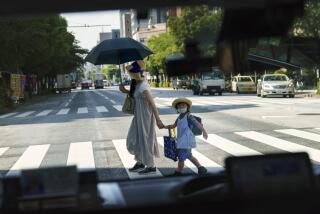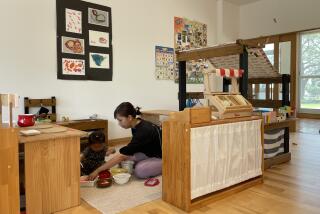Japan’s Wealth Doesn’t Buy Upscale Living Standards
- Share via
TOKYO — Many economists see Japan as the world’s richest nation because of the strong yen, trade surplus and stockpile of foreign exchange. Many Japanese see it as a rich country full of poor people.
Japan’s banks and companies dominate international lists, its citizens have the highest average income--$28,642 a year in 1986--in dollar terms, and the per-capita gross national product probably will overtake that of the United States this year. A recent report by the Tokai Bank, however, says living standards lag far behind.
High prices, overcrowding and a lack of leisure facilities have led some to question why Japan’s immense wealth has not translated into a better life style for the average Japanese.
“Japan has improved drastically since the end of the war, but individual Japanese still aren’t so well off,” said Shintaro Abe, former foreign minister and a top official of the governing Liberal Democratic Party.
“An officer at the Foreign Ministry still can’t invite visiting foreign officials to his home without feeling slightly embarrassed.”
Middle-class workers pay an average $133,333 to $266,666 to buy tiny homes that usually lack insulation and central heating.
Many young parents on small salaries make do in two-room apartments--described in one French report as “rabbit hutches”--and use public baths.
Food costs 1.5 times more on average in Japan than in the United States; fuel, light and water charges are 91% higher, and rent is 66% more expensive, according to a survey released last year.
“Prices are so terribly high,” says Tomoko Hirose, a Tokyo housewife. “I have only boys, and they eat so much . . . . It’s very hard to manage a household--and I’m relatively well off.”
Land price increases of more than 80% a year in Tokyo have far outpaced the ability of most Japanese to buy a house. Millions spend at least 90 minutes daily, each way, in “commuting hell” aboard jam-packed trains.
Some say Japan’s drive to become a world industrial power has sacrificed living standards for the sake of international economic might.
Kenichi Ohmae, outspoken social critic and a managing director of McKinsey & Co., a Tokyo consulting firm, says the political system may have suited a largely rural population 40 years ago, but it does not respond effectively to the needs of the urban, middle class.
While 80% of all Japanese live in cities, the system gives more weight to rural voting districts with few residents. The government forbids rice imports and restricts those of cheaper foods. Rice, the staple food, sells for $44 for a 22-pound sack in Tokyo, compared to $4 for a 20-pound bag in California.
Political protest has been limited by several factors.
Many Japanese look on today’s hardships as a godsend when compared to the years during and after World War II when even an electric fan was a luxury.
In addition, many Japanese don’t know about living conditions abroad.
“Most Japanese don’t realize that a man earning the same $18,000 a year in Milan, Italy, lives like a king, with a car, boat and even a second home,” Ohmae said.
Intense competition for the same goals--a good education, a job in a good company, and the same for one’s children--also inhibits protest, says Tokyo University Professor Shumpei Kumon.
Social problems are not grave. Few Japanese are homeless or unemployed. Violent crime is not widespread--there are 1.5 murders and 1.9 robberies per 100,000 people in Japan, compared to 9.1 homicides and 231.9 robberies in the United States. And the Japanese have the lowest infant mortality rate and longest life expectancy in the world--79.1 years for women and 73.6 years for men.
Finally, there is Japan’s obsession with consensus and compromise.
“If the urban majority were to impose its will on the rest of the nation,” by cutting prices and ending farmers’ privileges, “there could even be civil war,” Kumon says.
But Japan’s dedicated armies of salaried workers have begun to grumble. A study by the Nippon Life Insurance Co. indicates that almost two-thirds of 1,000 people polled felt that their living standards were low. The most common complaints? Housing, time spent commuting and a lack of free time.
For many people, the financial squeeze is getting tighter.
And about half of 10,000 white-collar workers polled in a Labor Ministry survey in April said they could not save the $100,000 or more they need for retirement. Many now must choose between children and owning a home, the survey said.
More to Read
Sign up for Essential California
The most important California stories and recommendations in your inbox every morning.
You may occasionally receive promotional content from the Los Angeles Times.













